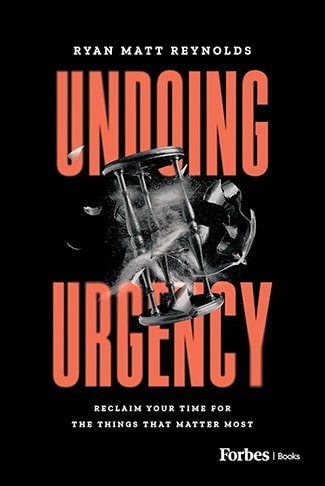ออฟไลน์ด้วยแอป Player FM !
Undoing Urgency — How to Stop Drowning in Tasks and Start Living With Purpose
Manage episode 454653767 series 2756263
Feeling overwhelmed by an endless to-do list? Like you're constantly putting out fires but never getting ahead? You're not alone. Many people today feel like they're drowning in urgency — filling every minute with tasks that feel critical in the moment but may not truly matter in the long run.
Here to help us understand how to escape this cycle is Matt Reynolds, a strength coach, business owner, and the author of Undoing Urgency: How to Focus on What Matters Most. Today on the show, Matt explains what creates that feeling of being overwhelmed by urgency, how to distinguish between status and true value, and why you can only effectively pursue 2-3 major goals at once. We discuss using the Eisenhower Decision Matrix to identify what tasks truly matter, how to apply the concept of "minimum effective dose" beyond just fitness, and why sometimes the pursuit of a goal matters more than achieving it. We end our conversation with concrete steps you can take today to start undoing urgency in your life.
Resources Related to the Podcast
- Matt's previous appearances on the AoM podcast:
- AoM Article: The Eisenhower Decision Matrix — How to Distinguish Between Urgent and Important Tasks and Make Real Progress in Your Life
- AoM Article: Motivation Over Discipline
Connect With Matt Reynolds

1095 ตอน
Manage episode 454653767 series 2756263
Feeling overwhelmed by an endless to-do list? Like you're constantly putting out fires but never getting ahead? You're not alone. Many people today feel like they're drowning in urgency — filling every minute with tasks that feel critical in the moment but may not truly matter in the long run.
Here to help us understand how to escape this cycle is Matt Reynolds, a strength coach, business owner, and the author of Undoing Urgency: How to Focus on What Matters Most. Today on the show, Matt explains what creates that feeling of being overwhelmed by urgency, how to distinguish between status and true value, and why you can only effectively pursue 2-3 major goals at once. We discuss using the Eisenhower Decision Matrix to identify what tasks truly matter, how to apply the concept of "minimum effective dose" beyond just fitness, and why sometimes the pursuit of a goal matters more than achieving it. We end our conversation with concrete steps you can take today to start undoing urgency in your life.
Resources Related to the Podcast
- Matt's previous appearances on the AoM podcast:
- AoM Article: The Eisenhower Decision Matrix — How to Distinguish Between Urgent and Important Tasks and Make Real Progress in Your Life
- AoM Article: Motivation Over Discipline
Connect With Matt Reynolds

1095 ตอน
ทุกตอน
×1 Philosophical Tools for Living the Good Life 1:02:07
1 The Swiss Army Knife of Fitness — How to Get Lean, Strong, and Flexible With Kettlebells Alone 50:45
1 The Winter Mindset: How Norwegians Love the Winter (And You Can Too) 1:01:34
ขอต้อนรับสู่ Player FM!
Player FM กำลังหาเว็บ




